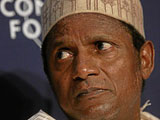Brazil’s Nigeria Peace Promise
By Samuel Logan for ISN
Nigerian President Umaru Musa Yar’Adua arrived in Brazil on 29 July for a three-day state visit, surrounded by ministers of defense, foreign business, science, technology, sport and energy. As his plane landed in the capital Brasilia, Nigerian troops shelled a mosque in northern Nigeria, where after three days of fighting between the government and a radical Islamic sect, over 250 people had been killed, external pageaccording to news reportscall_made.
The visit was Yar’Adua’s first trip to Brazil, and the first time a Nigerian head of state has visited Brazil since 2005. Brazilian President Luis Inacio “Lula” da Silva visited Nigeria in 2005 and 2006, both times to seek closer ties between the two countries. The high-level state visit exemplified Lula’s interest in bringing Brazil closer to African nations, a constant effort noted on Africa Day in Brazil in 2007, according to external pageAgencia Brasilcall_made.
His focus and interest on spurring development in Africa, however, came with a caveat.
“Peace is necessary for development,” Lula said, adding, “war does not allow for economic growth, educational development, or technological development.”
The Nigerian president, who in public remains very interested in receiving agricultural assistance and technology transfer from Brazil, especially with biofuels, likely left Brasilia assured that lasting peace was fundamental for continued support from Brazil.
In northern Nigeria, Mohammed Yusuf, who led the Boko Haram Islamic sect that called itself Nigeria’s ‘Taliban’, remained entrenched and defiant until his death on 30 July. Analysts considered that his death would for a time bring some peace to the war-torn northern region. Yet on 2 August, fighting broke out across northern Nigeria, with the most blood shed in the city of Maiduguri, in Borno state, where Yusuf was based.
Yar’Adua, now back from Brazil and in full knowledge of what Lula has to offer, should consider adding the promise of Brazilian agro-industry and technology to any peace negotiations. Nigeria’s northern region is largely agricultural and would benefit more from Brazil’s expertise than from the tribal bands of gunmen that Yar’Adua has used to extend sovereignty throughout Nigeria’s Islamic states.
Meanwhile in the Niger Delta, the Movement for the Emancipation of the Niger Delta (MEND), the militant wing of the Delta’s dominant Ijaw tribe, remains bridled by power- and oil revenue-sharing agreements with the Yar’Adua administration. So far, these agreements have supported peace across the Niger Delta, and the government is likely to draw up further accords to ensure support for the upcoming 2011 elections.
Tenuous peace has made room for external pageBrazil’s “Biofuel Town” initiativecall_made in the Delta region. Announced by a consortium of research institutes and nongovernmental organizations on Brazil’s Africa Day in 2007, the “Biofuel Town” was planned to be a settlement of initially 1,000 people who would become bio-energy experts, “learning from the Brazilian expertise in building sector-specific towns on the agricultural frontier,” according to external pageenvironmental science news portal Mongabaycall_made.
With lasting peace in the Delta, external pagePetrobrascall_made, arguably Lula’s most powerful foreign policy tool, has continued to help develop a network of ethanol plants across Nigeria, which use yucca to produce ethanol for domestic use and export.
Yar’Adua’s focus is now likely to be to ensure his political party’s position of power through the 2011 elections. After his trip to Brazil, the Nigerian president has a broader range of tools and technology to offer his people, rather than oppression and violence. Brazil stands ready to assist.
Both presidents know that the offer of Brazilian biofuel and agricultural technology holds significant promise for sustainable peace in Nigeria. It remains to be seen if Yar’Adua will choose his country and embrace Brazil’s offer, or choose personal power and focus on the near-sighted violent tactics that have kept him ahead but Nigeria woefully behind.

